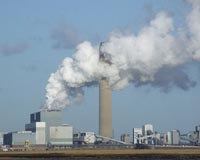 |
New York (UPI) Oct 8, 2009 New findings by two U.S.-based research organizations show global greenhouse gas emissions, widely seen behind current climate change, can be reduced to meet targets set for 2020 if world communities set their mind to concerted policy change and action. The U.N. Foundation, a public charity, and the Center for American Progress, a non-partisan research institute, unveiled an analysis of what they see as the core elements of the fight to combat climate change. In a joint presentation UNF President Timothy E. Wirth and CAP President John D. Podesta said 75 percent of the emission cuts needed to be in place by 2020 could be achieved through energy efficiencies, greater uses of renewable energy, conservation of depleting forests and a more sensible and sustainable use of land. The measures could offer up net savings of $14 billion, they said. The findings were released amid mixed messages from the preliminary round of U.N. climate talks in Thailand before the scheduled climate summit in Copenhagen, Denmark. Global improvements in energy efficiency are currently estimated to be growing at a rate of 1.25 percent, said the study. If the rate is pushed up to 2 percent by 2015 that would reduce greenhouse gas emissions by 12 percent below the rate likely to be prevailing in 2020. That reduction would represent a net saving of $98 billion by 2020, the study said. Likewise, if electricity generated through renewable sources is increased to the point where it represents a fifth of the world's total electricity production in 2020 that would mean a 10 percent reduction in greenhouse gas emissions by that year. The findings also calculate that halving the rate of tropical deforestation at the same time as improving land use can lead to a 50 percent cut in emissions by 2020. The study recommends more sustainable forestry and land management and greater attention to how and where livestock is raised. The report calls for introducing programs of national adaptation in the least developed and vulnerable developing countries to better prepare populations for a more sustainable approach to use of resources. "A new international agreement is urgently needed to address climate change," said Wirth. "It must include emission reduction targets by developed countries, nationally appropriate mitigation actions by developing countries, financial assistance to developing countries, and technology cooperation." He said the core elements of a new agreement should include areas where all countries, both developed and developing, can take immediate action to reduce emissions. He said such action would also help economic growth, energy security and public health. Wirth said the findings showed how "very substantial progress can be made toward the emissions cuts we need over the next 10 years at very low cost -- in fact, with a net benefit to the global economy overall." Share This Article With Planet Earth
Related Links
 Greens hail E.ON delay for British coal plant
Greens hail E.ON delay for British coal plantLondon (AFP) Oct 8, 2009 Environmentalists welcomed on Thursday a decision to postpone construction of a coal-fired power station in Britain, saying it was a victory for their opposition to new "clean coal" technology. German energy giant E.ON blamed the global recession for its decision to delay investment plans for the plant at Kingsnorth in Kent, southeast England, by "up to two to three years". But green ... read more |
|
| The content herein, unless otherwise known to be public domain, are Copyright 1995-2009 - SpaceDaily. AFP and UPI Wire Stories are copyright Agence France-Presse and United Press International. ESA Portal Reports are copyright European Space Agency. All NASA sourced material is public domain. Additional copyrights may apply in whole or part to other bona fide parties. Advertising does not imply endorsement,agreement or approval of any opinions, statements or information provided by SpaceDaily on any Web page published or hosted by SpaceDaily. Privacy Statement |